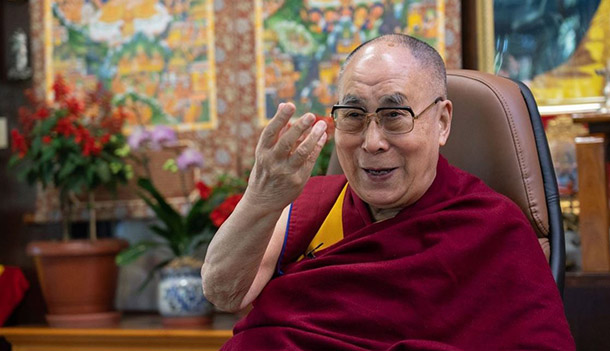Dharamshala, India — "This century should be a century of peace. To create a peaceful century, look at inner emotion, We must reduce those emotions which create violence; That also through reasoning," His Holiness the Dalai Lama said during a group of peacebuilders from the "Peace Studio" based in the USA.
His Holiness' remarks came during a rally on Saturday, the peacebuilders as part of the ‘Conversations that offer peace’ campaign organised by the New York-based "Peace Studio", on 21 September 21, 2020. The Peace Studio supports, trains, and unites "the next generation of artists, journalists, and storytellers to inspire people everywhere to become active peacebuilders."
“Today’s world, comparatively I think everywhere people now feel that peace is very important. In the previous century, we spent a lot of money and scientific knowledge on constructing weapons, including nuclear weapons. Now I think that kind of mental attitude much changed. Now people are showing serious concern about peace; that’s very important," His Holiness said, adding: "Today due to this illness also, the economic situation is facing some difficulties. In such a period, thinking about the weapon is impractical and outdated. Now we must think of a peaceful world."
"Peace does not come from the sky; the opposite of peace is violence and who creates violence—we human being. Therefore automatically peace is our responsibility. We, human beings who create violence have the responsibility to bring peace. Peace is ultimately related to the inner peace-more sense of concern for other’s wellbeing, more sense of concern of 7 billion human beings. That’s the ultimate source of peace," the Nobel Peace Laureate said.
"Just word peace not bring peace. Ultimately we have to develop inner peace. Now the destroyer of inner peace is anger and fear. In our minds, there is a variety of emotions. Compassion, forgiveness, tolerance, are the foundation of inner peace. Anger, jealousy, fear are related to a self-centered attitude. A more altruistic attitude is to look at the entire 7 billion as our brother and sister. I want peace; they also want peace. I appreciate other people’s smiles and loving-kindness. We also show them loving kindness and smile," the Tibetan leader said.
"Through that way, we can develop a peaceful, compassionate family, compassionate community through education, not talking about the next life or heaven. But automatically, we remain more compassionate that’s the best way to offer to God. According to theistic religion, god himself infinite love. All religions talk about loving-kindness. Therefore, whether we accept religion or not, that practice is the best way of practice of religion. All major religious traditions inspire different concepts and cultural aspects, all carry the main message of love and loving-kindness. Therefore, now we should make efforts to bring inner peace; through that way, real peace comes," he further said.
"This century should be a century of peace. To create a peaceful century, look at inner emotion, We must reduce those emotions which create violence; That also through reasoning. Anger firstly destroy inner peace. One person loses temper then in the whole surrounding, everybody feels unhappy; that’s the work of anger. On the other hand, compassion, peace create a peaceful and happy atmosphere. Whether we accept religion or not, even within religion, what kind of religious tradition we follow, but we must pay more attention to inner peace," the Buddhist leader said.
"In terms of inner peace, what kind of emotion is destroying our inner peace? That is anger. Physically as well, anger is very bad. Constant anger causes heart beating and blood pressure; these things happen. More peaceful, compassionate mind, [affects] physical condition also, such as no blood pressure. As human beings, we always face some problems. An individual who has inner peace can maintain peace of mind no matter what problem appears. Through that way, I think a peaceful mind is the best hygiene of physical. I often now expressing physical hygiene is important but hygiene of emotion is more important," the Nobel Peace Laureate further said.
"The existing modern education [does] not much talk about mind, emotion. That I think Indian tradition and particularly Buddhist tradition, [offer] a lot of explanation about emotion, mind, and how to tackle destructive emotions. So [these can be introduced in modern education] as an academic subject, not religion. I have some friends among scientists. Some scientists are also showing interest. They also [provide a] good reason," he added.
"We are a social animal, and in any social animal, the sense of concern of the community is biologically there. On that seed or basis, [by using] our intelligence combined with scientific research, we can develop inner peace," the spiritual leader of Tibet concluded by saying, "So I want to share with you. These are not only just my words, I myself practice these things, so it really helps."


![Tibet has a rich history as a sovereign nation until the 1950s when it was invaded by China. [Photo: File]](/images/stories/Pics-2024/March/Tibet-Nation-1940s.jpg#joomlaImage://local-images/stories/Pics-2024/March/Tibet-Nation-1940s.jpg?width=1489&height=878)
















